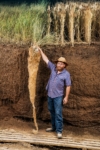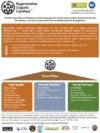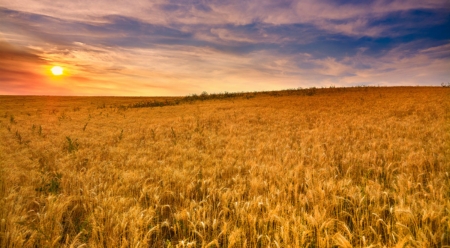Join Us: The Journey to Regenerative Organic Certification
Working closely with Rodale Institute, Dr. Bronner’s and other key allies, we created Regenerative Organic Certification to establish a new, high bar for regenerative organic agriculture. The certification is the result of a lively and cooperative effort among a coalition of change-makers, brands, farmers, ranchers, nonprofits and scientists, all with a clear goal: to pave the way to an agricultural future focused on enriching the soil, while valuing people and animals. Our approach does not aim to supplant existing organic standards, but instead provides detailed guidance on how producers can establish and implement a regenerative organic framework that builds soil health.
The need is clear: “Conventional agriculture” is harming the planet, exposing people to toxic chemicals, and causing unnecessary suffering to animals that support the system. Just as alarming is the fact that the earth’s topsoil is degrading and eroding at an alarming rate: Scientists predict that current industrial farming practices and deforestation will eliminate topsoil within 60 years. As grim as this picture looks, the promise of regenerative organic agriculture is not only a process that can rebuild critically needed topsoil, but also one that potentially sequesters carbon at the same time. In 2014, research by Rodale Institute estimated that if current crop acreage and pastureland shifted to regenerative organic practices, 100% of annual global CO2 emissions could be sequestered in the soil.

Crop researcher Jerry Glover in front of a root display showing Kernza® on the left—a perennial grain grown using regenerative organic agriculture practices—and annual wheat on the right. Kernza’s long root system and perennial growth allows it to thrive without tilling, preserving precious top soil. It also uses less water than conventional wheat and removes more carbon from the atmosphere. We use Kernza grain in Patagonia Provisions Long Root Ale. Photo: Jim Richardson
In recent years, a boom for organics has coincided with a boom for imposters. For all those who stay true to established organic standards with an honest approach to regenerative practices, others greenwash their way to profitability by preying on confused consumers, while they continue using pesticides and ignoring basic animal and social welfare needs.
Farmers face major difficulties as they transition from conventional to organic and—eventually—to regenerative organic farming practices. However, our planet cannot afford the continued agricultural status quo. For regenerative organic agriculture to flourish, we need a strong and unified understanding of what regenerative organic agriculture entails; we need to come together with our best minds, learning together and improving this high-bar standard. The additional benefits include less pollution, more biodiversity, fewer threats to wildlife, healthier rivers, significantly reduced risk to workers, and improved public health from a reduction of environmentally linked cancers and respiratory diseases. Contrary to messages sent by big agriculture interests, regenerative organic agriculture could improve yields as the soil’s micronutrients come back to health. Over time, organic outperforms conventional.
Regenerative Organic Certification does not aim to compete with—or negate—current organic standards. It builds upon the standards set forth by USDA Organic and similar programs internationally, particularly in the areas of animal welfare and farmer and worker fairness. With additional emphasis on the regenerative organic practices aimed at increasing soil health and potentially sequestering carbon, we could mitigate the damage conventional agriculture has done to our shared planet.

The below link represents a framework for certification. As we move toward a final version that will be facilitated by NSF International, we’d like your comments and input. Please read the document and consider how all parts of the industry—farmers, ranchers, manufacturers, brands and consumers—can use it as a tool to work toward a better future for agriculture. We hope you will not only review the certification now, but begin making real plans to adopt it as a serious objective going forward. We understand this requires investment and hard choices; but with so much at stake, in the end, bold solutions require bold actions.
If you are interested in reviewing and commenting on the Regenerative Organic Certification requirements, please refer to http://standards.nsf.org/apps/group_public/document.php?document_id=39305 and contact Jessica Evans, Director of Standards Development at NSF International (jevans@nsf.org). After the public comment period is complete, brands, farmers and ranchers are encouraged to embrace these practices, incorporate them into their supply chains, and create a market for products that have received Regenerative Organic Certification. We understand even the greenest brands won’t currently check every box for the highest-level certification, but like everything with supply chains, this is a journey, and we hope you will join us in making a better world.
Thank you for your participation in this vital process.

